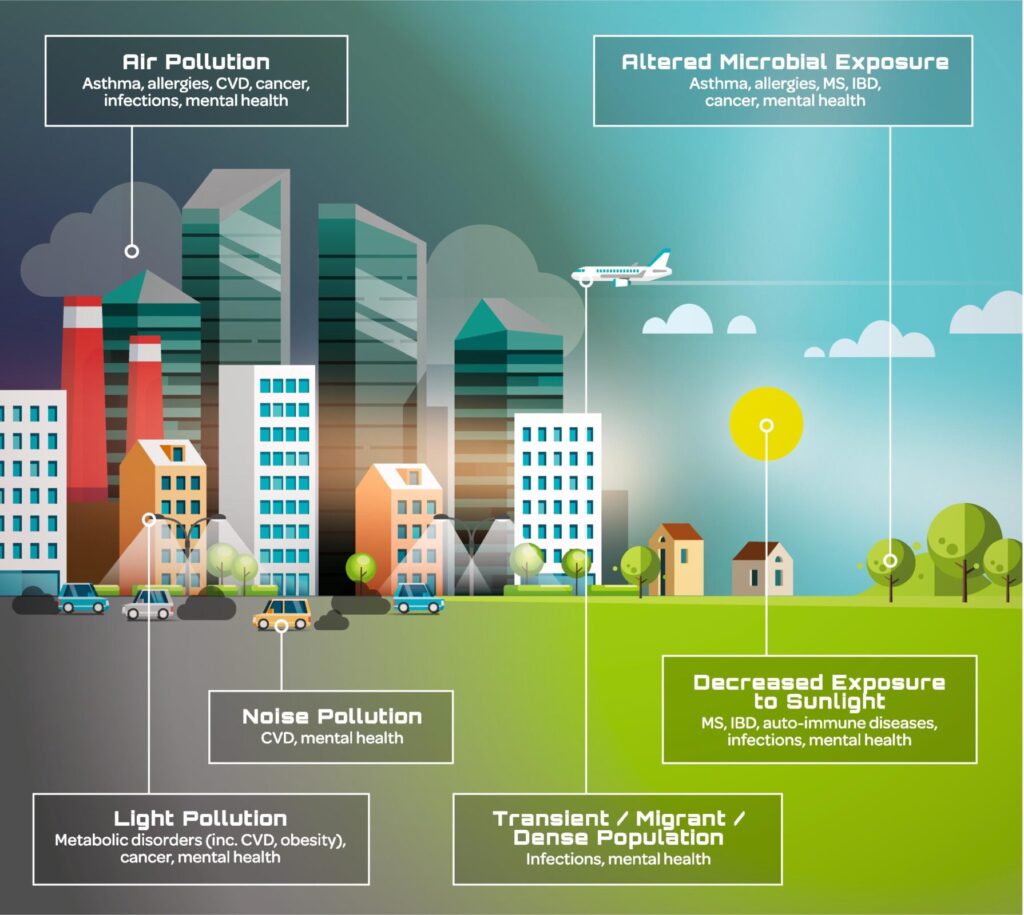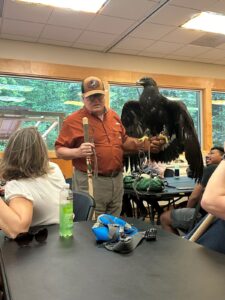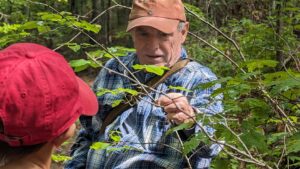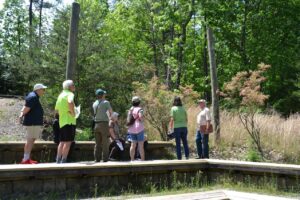
Heather N. Kolich, ANR Agent, UGA Extension Forsyth County
Earlier this month, I had the opportunity to go out and do NestWatch monitoring with the Forsyth County Master Naturalist Extension Volunteers (MNEV). After months of spending all of my daylight hours in buildings and the car, I thoroughly enjoyed spending a couple of hours walking the Bluebird Trail at Chattahoochee Pointe Park, breathing fresh air, listening to bird and frog calls, smelling the wet grass, and feeling the squish of my completely soaked socks. And then there was the thrill of seeing eggs and hatchlings in their nests. I had a wonderful morning, got some exercise, and felt happy all day long.
Relationships of human health and nature

It’s a well-researched fact that people need nature interactions; however, over 75% of Georgians live in urban areas, with high population density, tons of concrete and asphalt, noise and light pollution, and more buildings than trees. Separation from the natural world has negative consequences for both physical and mental health. Health risks associated with urban environments include increased allergies and asthma, obesity, diabetes, cardiovascular disease, auto-immune diseases, depression, anxiety, and vitamin D deficiency.
We need exposure to sunshine to produce vitamin D, which supports bone health, immunity, and muscle and brain function. We need exposure to soil and pollen early in life to develop tolerances against allergic reactions and asthma. Isolation from nature and green spaces increases feelings of stress, depression, and anxiety, and may constitute a risk factor for developing dementia.
On the other hand, decades of studies consistently show positive health benefits of nature exposure and experiences. These include lowered blood pressure, reduced stress, reduced depression, improved cognition and mental functioning, improved social connections, and a lower mortality from cardiovascular disease.
Nature engagements with Parks & Rec and Extension

Forsyth County has 26 parks, three campgrounds, and five trailheads connecting us to the Big Creek Greenway, giving us plenty of options to get outdoors. Just being in nature improves mood; being active in nature improves health; and interacting with nature can benefit the overall health of people and the environment.
Within our parks, non-native invasive plants are causing environmental problems. Invasive plants choke out native plants, and that has a ripple effect on other components of the ecosystem. Without native plants for food and habitat, birds and wildlife leave the area.
As a community, we can help our parks and natural spaces. Working with the Forsyth County Parks and Recreation Department, Extension is launching a program to remove Japanese stiltgrass (Microstegium) from areas of our parks. We’ll need lots of helpers and lots of hands to pull up this forest-floor-blanketing grass. Fortunately, this invasive plant is shallow-rooted, so it’s easy to hand weed. Extension staff and MNEVs will host Invasive Plant Action Classes at Chattahoochee Pointe Park and Sawnee Mountain Preserve on July 18, 19, 25, and 26. If you have a club, group, or family outing and would like to join us for a walk in the park and some nature restoration, please contact Forsyth.extension@uga.edu.
For some wildlife Wow, bring the family to Sawnee Mountain Preserve Visitor Center on August 9 for a day of Wilderness Wonders. Buster Brown and his birds of prey from Georgia Mountain Falconry will be there, and you’ll have opportunities to learn about pollinators, invasive species, citizen science, and to get moving with tree identification walks and activities in forestry and wildlife led by Extension 4-H Youth Development staff and Master Naturalists.
Learn more with Georgia Master Naturalist training

The Bluebird Trail that I mentioned earlier is one citizen science project developed and maintained by Forsyth County MNEVs in partnership with Forsyth County Parks and Recreation. The original Bluebird Trail was installed at Fowler Park to encourage the return of native Eastern bluebirds that fled the area during park construction. It was so successful that the MNEVs established a second Bluebird Trail at Chattahoochee Pointe Park.
Each year, the nesting boxes on both trails host a variety of native birds, including prothonotary warblers, a species of concern throughout its range due to habitat loss. Each nesting season, MNEV amateur ornithologists collect data on the species nesting, the number of eggs laid, and the number of fledglings reared. Through NestWatch, this data builds our national knowledge of the effects that habitat loss, urban expansion, climate change, invasive species, and restorative actions have on native bird populations in specific regions.
Other Forsyth County MNEV projects include monitoring and collecting data on frogs and bats and managing two native plant conservation and demonstration projects, the Native Tree Trail along the Big Creek Greenway and the native fruit and nut Sustainable Community Orchard at Chattahoochee Pointe Park. These UGA Extension-trained volunteers share their knowledge through environmental education events, public lectures, and coaching 4-H youth in wildlife and forestry programs.